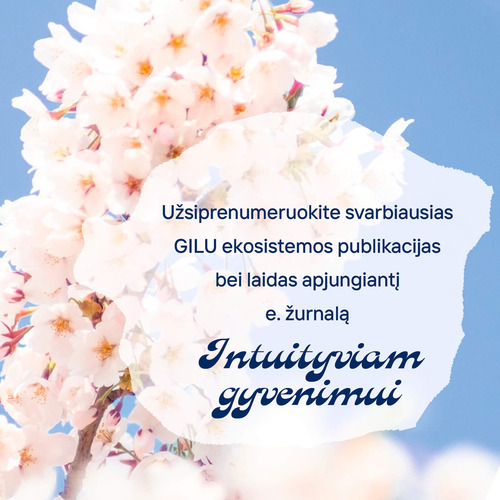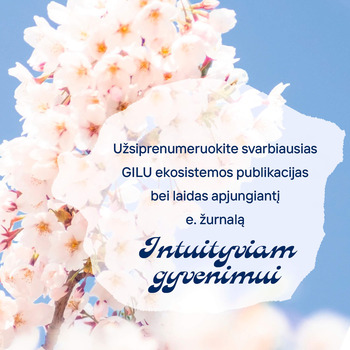Publications
- Home
- Publications
- Rinardas Goda, entrepreneur, trainer: the future direction of business is to stop participating in competitive competitions
Rinardas Goda, entrepreneur, trainer: the future direction of business is to stop participating in competitive competitions
2022 09 25LRT.lt
Ten years ago, Rinardas Goda, entrepreneur, trainer, private school founder and HAI Institute alumnus, was under great pressure to turn the business turbine faster and faster, and was experiencing burnout and the threat of his family falling apart. Today, he teaches that you can achieve growth, prosperity and great results not by racing, but by talking and listening to yourself and to others.
- Rinard, you have a wide range of activities and interests; how would you introduce yourself and what you do?
- I am currently focusing on training for entrepreneurs, where I share my knowledge and experience on how to build a lively organisation and how to reconstruct a mechanical approach to business. I am a father of four children. I also work with children several times a week in a private school, which I co-founded. It so happens that I am currently doing teaching work. I have to admit that I am not surprised by this name.
The teaching profession has always seemed very distant. I spent 27 years in business, and this journey led me, together with other like-minded people, to found a school for the man of the future five years ago. There we teach children various general competences, learn about their capabilities, their bodies, their emotions and how to resolve conflicts.
The school was born out of the realisation that adults are very poorly competent in these basic subjects. I wanted people to feel different when they leave school, to be able to learn and adapt easily, and at the same time to have a core that they can always lean on. Nowadays, everyone is talking about the abundance of choices, and it is particularly important to learn how to create your own trajectory, not to lose consistency.
- How important is the criterion of intuitiveness in your teaching and business?
- I feel like I'm always striving for it; there's an endless road to it. Perhaps the most striking step on this journey was taken five years ago when I suggested to everyone in my organisation that we stop running in the circle of competition. A bold proposal. I was only able to make it because I was a shareholder and founder of that organisation. I suggested that we stop and spend one day just talking.
To sit in a circle, not to hide behind computers, to talk less formally, more openly.
Eventually, by practising such conversations, even between the constantly fighting sides in the organisation, listening and hearing began to emerge. We probably know of many examples of organisations where several groups are in constant conflict, for example, the supply department with sales. That was the case with us, too, for about 20 years, and it seemed that nerves just had to be burnt, and that is the case everywhere.
And so, over a year's time, my suggestion to stop and talk has healed the organisation and has produced amazing results. We have seen that this is the way to grow - not by running even faster, but by talking, by calming down, by being able to solve difficult tasks. It happens that organisations withdraw from the competition and go into a quagmire of bureaucracy, of rules, where it seems safer, everything is described. We have managed to avoid this and I now believe that this model is the future direction of business.
It turned out that a slower, more conscious organisation is just as resilient to competition - the harder it is around us, the better it is for us. Difficulties just toughen people up, they start to see challenges as a game. So slow is faster.
- You mentioned that this model is the way of the future. What other future trajectories do you see?
- In my observation, the biggest prospect and return now and in the future is in education. Here is the greenest grass, the most promising topic. I see myself in this field now. It is easy to see that the current model of education is outdated and completely out of step with modern times, it is just coming apart at the seams. But the schools continue to pump out the knowledge that you can get by sitting in front of a computer. I find it very interesting to analyse what the world will be like in ten years' time, what competences it will need.
The other direction and, I would say, the transformation of understanding in business is that the organisation is not a mechanical entity designed only to compete for resources and to achieve financial goals dictated by shareholders. A mechanical approach is not bad, it is simply a reflection of a certain stage of development. However, there comes a time when organisations are transforming, or emerging as a living entity. Living organisations think about why the world needs us, and have a very different idea of the meaning of existence, which is often not about money.
Another, very important, business direction is people and relationships in business, a field of trust where you can be yourself. It is in a living organisation where autonomy prevails, there is no boss-subordinate relationship, people are empowered to act on their own, and the leadership demonstrated is one that floats. All this is well described in Frederic Laloux's book Reinventing organisations, which is currently being translated into Lithuanian. I think it will be a major shock to our market.
One of the consequences of a living organisation is that each member takes responsibility. All the control mechanisms that record the time spent at work or on a task can be thrown away. In normal organisations, an employee's responsibilities are defined by a narrow circle around the person and this is called a job description. This may work for a while, until unexpected challenges arise where, as a rule, boundaries have to be crossed.
In living organisations, the circle is a pulsating one, the person feels responsible beyond the job description and can act in unforeseen circumstances.
I notice that living organisations have an impact on interpersonal relations outside work. People start to talk more within the family, discover the format and rhythm of their conversations, and see the deeper meaning of those conversations.
- I'm very curious, how did the change in your own perception of how the business and you in it should function begin? Was that the first step when you proposed to stop five years ago?
- It was five years ago. At that time, I was attending psychodynamic sessions and seminars led by the founder of the HAI Institute, Rasa Baltė Balčiūnienė, on the meaning of business and how to make sense of it. I came to those sessions in the midst of a mid-life crisis, burnt out, with a family falling apart, feeling completely worn out, but I kept thinking how to find the strength to turn that business turbine even faster.
After the workshops, I realised that my business partners had to answer those questions of meaning for themselves, but it was very difficult to get them all together - they were all spinning their own squirrel wheels. But somehow we managed to organise a psychodynamic session in our organisation and already in 2011 we made a big change and the transformation started.
- I want to come back to the weekly meetings and conversations in your organisation. It is common practice in business to meet when there is a need to do so, when there is a problem to be solved, or to review results. Was there a lot of scepticism, a lot of resistance when you proposed a very different model?
- Meetings are not only when they are needed and are part of the healing of an organisation. When we used to have meetings in the company only when we needed to resolve something, when there was a problem, we found that as soon as we finished something, something happened again. Those problems just seemed to multiply. Now I realise that wherever we put our attention, that is the result. Now everyone is empowered to tackle different challenges, has the authority to do so, to invest in solving them, and to present how he/she managed to tackle the challenge, and then we reflect together as a team.
We are currently using a non-violent communication model in our meetings, which helps us to distinguish constructive from destructive conflict and teaches us not to get personal, not to rely on status, etc. when dealing with conflict. We all bring with us some limiting personalities, complexes, etc., but when there is no environment for this in the organisation, they simply don't have a chance to express themselves. In this way, one heals in one's work, in one's organisation, and brings light home.
- Sounds idyllic! Finally, how would you describe your intuitive life in a few words?
- For me, intuition only speaks in the silence, in the emptiness. I talk to myself through the various meditations I practice. Through them I understand what I have to do, what turn to take, when I have to change something, what decision to make. These are very sensitive and fragile moments that cannot be drowned out by noise, deadlines, tensions.











